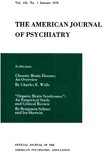NAVY PSYCHIATRIC ASSESSMENT PROGRAM IN THE ANTARCTIC
Abstract
The Navy program for psychiatric assessment of personnel wintering over in the Antarctic has been described. During the 5-year history of the assessment program, there have been no documented cases of psychotic illness. Six men have been admitted to the sick list for psychiatric reasons, only one of whom had been through the assessment procedure. This case was diagnosed as a personality disorder. Thus, it would appear that the program has been effective in identifying and eliminating individuals who will develop serious or incapaciting emotional illnesses under the stress of isolation.
An analysis of data relating to performance effectiveness in the Antarctic shows that there is a significant positive correlation between the initial psychiatric prediction and subsequent performance. However, because of several limitations in the data, the results in this aspect of the study should be interpreted with caution.
Certain shifts have occurred in the assessment criteria during the past 5 years. The most important variable in adjustment to Antarctic isolation now is considered to be vocational effectiveness. The structure and composition of the small isolated group is next in importance. Except for extreme rigidity, there are no neurotic mechanisms which are considered, per se, to be disqualifying. However, personality disorders do constitute a rather serious problem.
Access content
To read the fulltext, please use one of the options below to sign in or purchase access.- Personal login
- Institutional Login
- Sign in via OpenAthens
- Register for access
-
Please login/register if you wish to pair your device and check access availability.
Not a subscriber?
PsychiatryOnline subscription options offer access to the DSM-5 library, books, journals, CME, and patient resources. This all-in-one virtual library provides psychiatrists and mental health professionals with key resources for diagnosis, treatment, research, and professional development.
Need more help? PsychiatryOnline Customer Service may be reached by emailing [email protected] or by calling 800-368-5777 (in the U.S.) or 703-907-7322 (outside the U.S.).



